HLTENN010 Essay: Advanced Care Planning and Directives - 2019
VerifiedAdded on 2022/09/17
|7
|1755
|19
Essay
AI Summary
This essay presents an argument in favor of advanced care planning (ACP) and advanced care directives (ACD), focusing on their role in improving the quality of life for patients at the end-of-life stage. The introduction highlights the importance of ACP in preparing patients and their families for future health decisions, especially when patients are unable to communicate. The discussion section delves into the legal aspects of ACP, particularly the Medical Treatment Planning and Decisions Act 2016 in Victoria, Australia, which provides a framework for healthcare professionals and patients. It explains instructional directives, the appointment of decision-makers and support persons, and the positive outcomes associated with ACP, such as increased patient satisfaction and reduced burden on family members. The essay references research studies that validate ACP and ACD, highlighting the protection of human rights and the minimization of potential conflicts. The conclusion reiterates the benefits of ACP, emphasizing its significance in ensuring patients' treatment preferences are considered, and its role in lessening the disease burden. The essay supports the argument that ACP and ACD should be encouraged to ensure patient autonomy and improved end-of-life care.
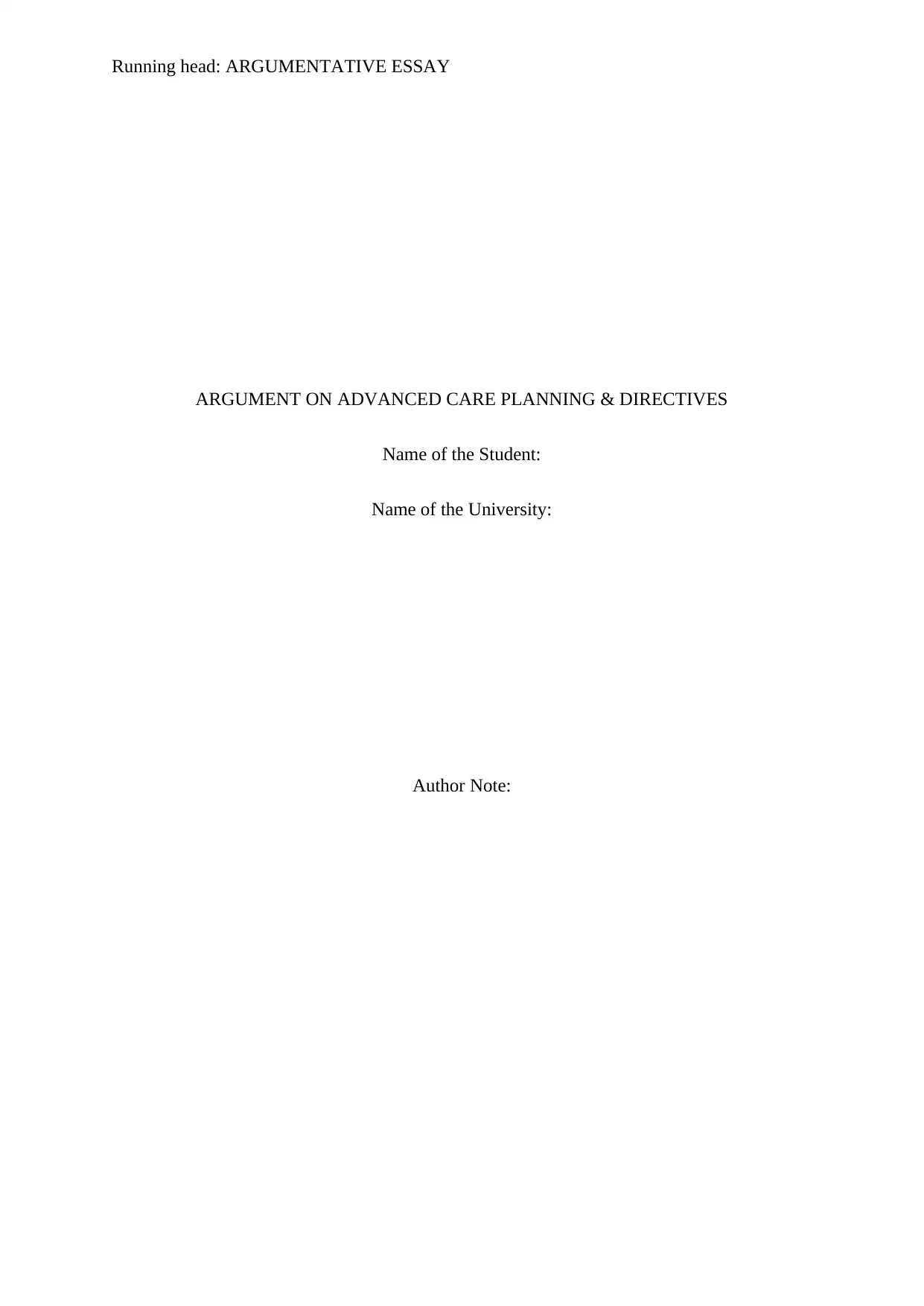
Running head: ARGUMENTATIVE ESSAY
ARGUMENT ON ADVANCED CARE PLANNING & DIRECTIVES
Name of the Student:
Name of the University:
Author Note:
ARGUMENT ON ADVANCED CARE PLANNING & DIRECTIVES
Name of the Student:
Name of the University:
Author Note:
Paraphrase This Document
Need a fresh take? Get an instant paraphrase of this document with our AI Paraphraser
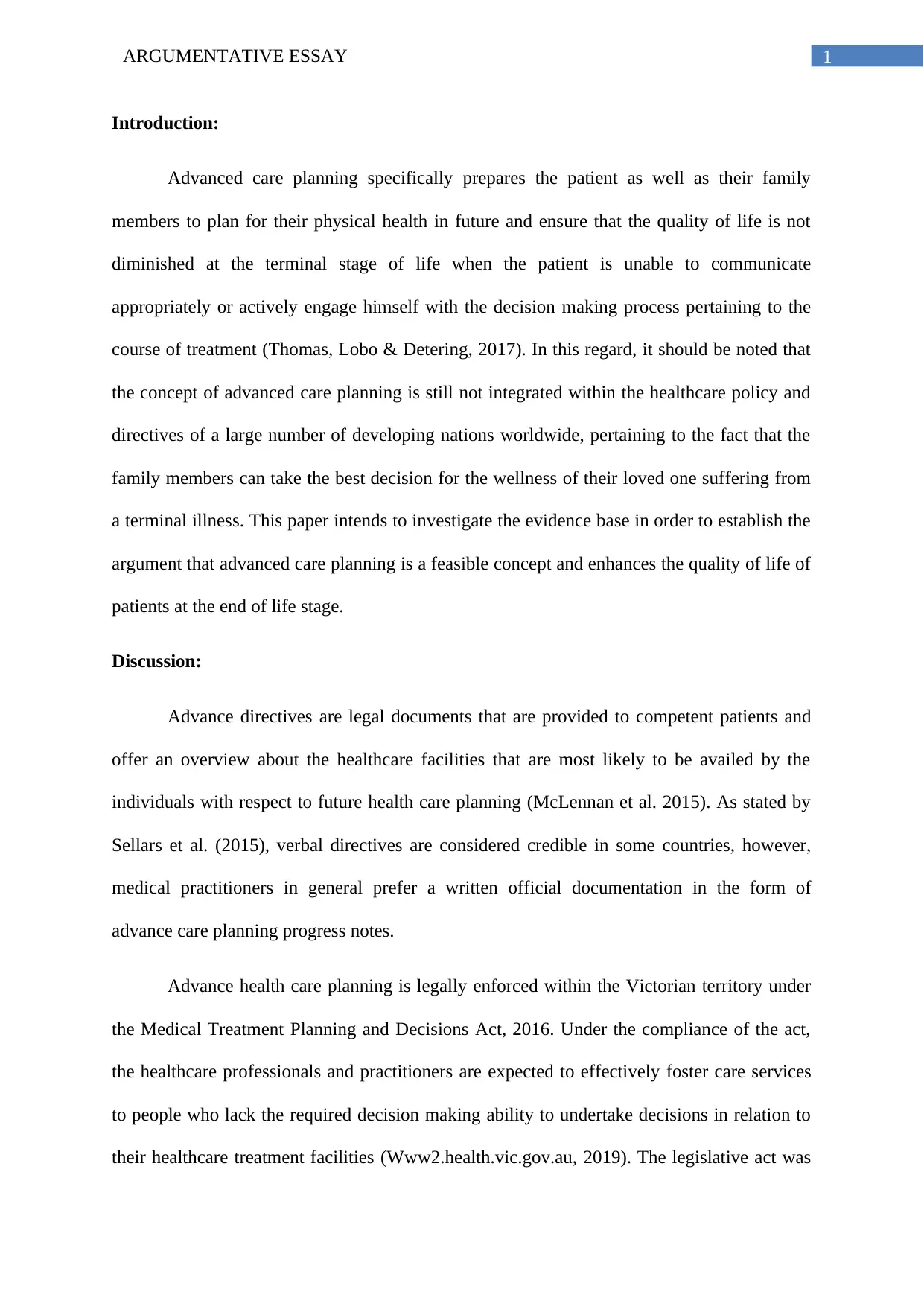
1ARGUMENTATIVE ESSAY
Introduction:
Advanced care planning specifically prepares the patient as well as their family
members to plan for their physical health in future and ensure that the quality of life is not
diminished at the terminal stage of life when the patient is unable to communicate
appropriately or actively engage himself with the decision making process pertaining to the
course of treatment (Thomas, Lobo & Detering, 2017). In this regard, it should be noted that
the concept of advanced care planning is still not integrated within the healthcare policy and
directives of a large number of developing nations worldwide, pertaining to the fact that the
family members can take the best decision for the wellness of their loved one suffering from
a terminal illness. This paper intends to investigate the evidence base in order to establish the
argument that advanced care planning is a feasible concept and enhances the quality of life of
patients at the end of life stage.
Discussion:
Advance directives are legal documents that are provided to competent patients and
offer an overview about the healthcare facilities that are most likely to be availed by the
individuals with respect to future health care planning (McLennan et al. 2015). As stated by
Sellars et al. (2015), verbal directives are considered credible in some countries, however,
medical practitioners in general prefer a written official documentation in the form of
advance care planning progress notes.
Advance health care planning is legally enforced within the Victorian territory under
the Medical Treatment Planning and Decisions Act, 2016. Under the compliance of the act,
the healthcare professionals and practitioners are expected to effectively foster care services
to people who lack the required decision making ability to undertake decisions in relation to
their healthcare treatment facilities (Www2.health.vic.gov.au, 2019). The legislative act was
Introduction:
Advanced care planning specifically prepares the patient as well as their family
members to plan for their physical health in future and ensure that the quality of life is not
diminished at the terminal stage of life when the patient is unable to communicate
appropriately or actively engage himself with the decision making process pertaining to the
course of treatment (Thomas, Lobo & Detering, 2017). In this regard, it should be noted that
the concept of advanced care planning is still not integrated within the healthcare policy and
directives of a large number of developing nations worldwide, pertaining to the fact that the
family members can take the best decision for the wellness of their loved one suffering from
a terminal illness. This paper intends to investigate the evidence base in order to establish the
argument that advanced care planning is a feasible concept and enhances the quality of life of
patients at the end of life stage.
Discussion:
Advance directives are legal documents that are provided to competent patients and
offer an overview about the healthcare facilities that are most likely to be availed by the
individuals with respect to future health care planning (McLennan et al. 2015). As stated by
Sellars et al. (2015), verbal directives are considered credible in some countries, however,
medical practitioners in general prefer a written official documentation in the form of
advance care planning progress notes.
Advance health care planning is legally enforced within the Victorian territory under
the Medical Treatment Planning and Decisions Act, 2016. Under the compliance of the act,
the healthcare professionals and practitioners are expected to effectively foster care services
to people who lack the required decision making ability to undertake decisions in relation to
their healthcare treatment facilities (Www2.health.vic.gov.au, 2019). The legislative act was
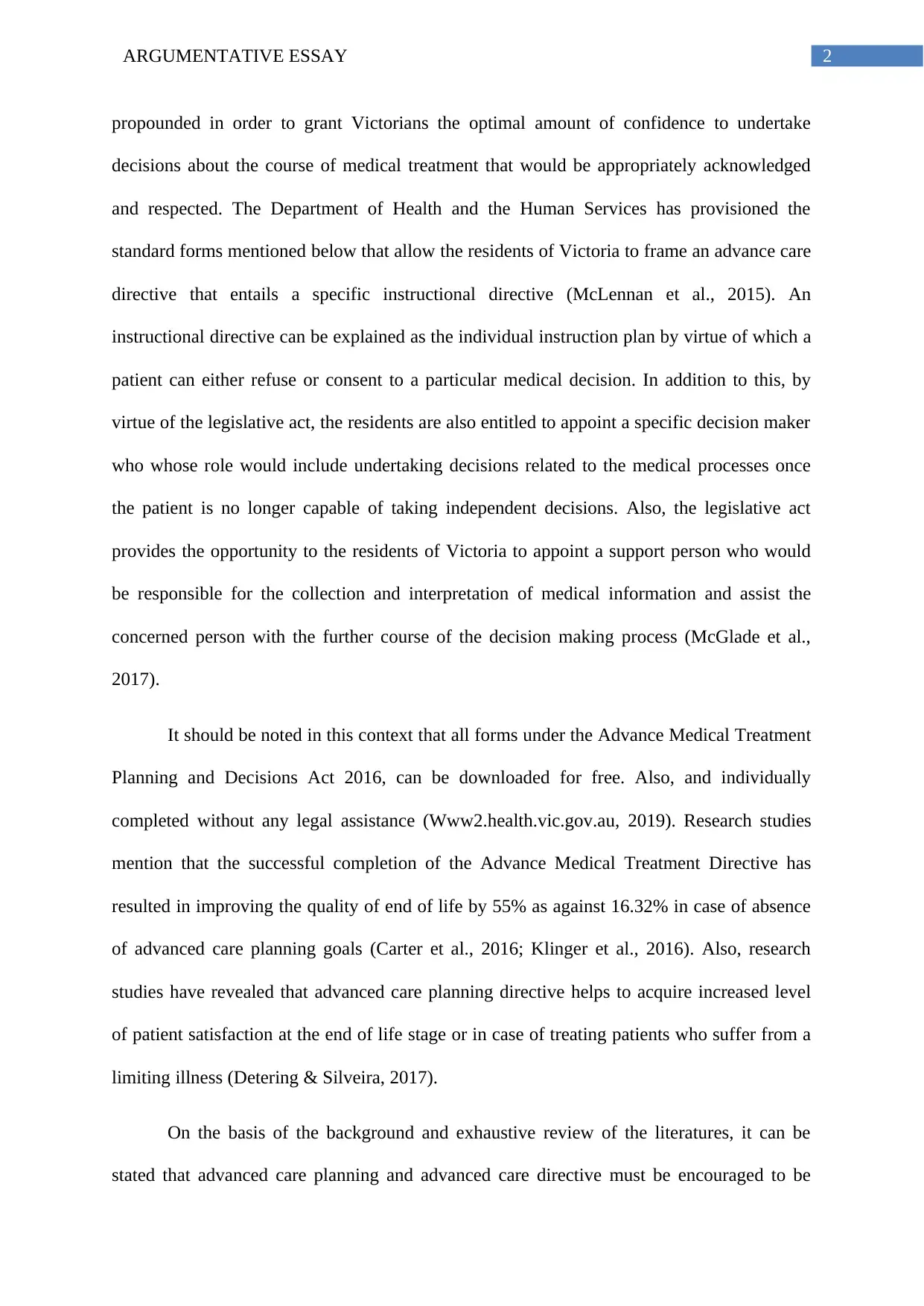
2ARGUMENTATIVE ESSAY
propounded in order to grant Victorians the optimal amount of confidence to undertake
decisions about the course of medical treatment that would be appropriately acknowledged
and respected. The Department of Health and the Human Services has provisioned the
standard forms mentioned below that allow the residents of Victoria to frame an advance care
directive that entails a specific instructional directive (McLennan et al., 2015). An
instructional directive can be explained as the individual instruction plan by virtue of which a
patient can either refuse or consent to a particular medical decision. In addition to this, by
virtue of the legislative act, the residents are also entitled to appoint a specific decision maker
who whose role would include undertaking decisions related to the medical processes once
the patient is no longer capable of taking independent decisions. Also, the legislative act
provides the opportunity to the residents of Victoria to appoint a support person who would
be responsible for the collection and interpretation of medical information and assist the
concerned person with the further course of the decision making process (McGlade et al.,
2017).
It should be noted in this context that all forms under the Advance Medical Treatment
Planning and Decisions Act 2016, can be downloaded for free. Also, and individually
completed without any legal assistance (Www2.health.vic.gov.au, 2019). Research studies
mention that the successful completion of the Advance Medical Treatment Directive has
resulted in improving the quality of end of life by 55% as against 16.32% in case of absence
of advanced care planning goals (Carter et al., 2016; Klinger et al., 2016). Also, research
studies have revealed that advanced care planning directive helps to acquire increased level
of patient satisfaction at the end of life stage or in case of treating patients who suffer from a
limiting illness (Detering & Silveira, 2017).
On the basis of the background and exhaustive review of the literatures, it can be
stated that advanced care planning and advanced care directive must be encouraged to be
propounded in order to grant Victorians the optimal amount of confidence to undertake
decisions about the course of medical treatment that would be appropriately acknowledged
and respected. The Department of Health and the Human Services has provisioned the
standard forms mentioned below that allow the residents of Victoria to frame an advance care
directive that entails a specific instructional directive (McLennan et al., 2015). An
instructional directive can be explained as the individual instruction plan by virtue of which a
patient can either refuse or consent to a particular medical decision. In addition to this, by
virtue of the legislative act, the residents are also entitled to appoint a specific decision maker
who whose role would include undertaking decisions related to the medical processes once
the patient is no longer capable of taking independent decisions. Also, the legislative act
provides the opportunity to the residents of Victoria to appoint a support person who would
be responsible for the collection and interpretation of medical information and assist the
concerned person with the further course of the decision making process (McGlade et al.,
2017).
It should be noted in this context that all forms under the Advance Medical Treatment
Planning and Decisions Act 2016, can be downloaded for free. Also, and individually
completed without any legal assistance (Www2.health.vic.gov.au, 2019). Research studies
mention that the successful completion of the Advance Medical Treatment Directive has
resulted in improving the quality of end of life by 55% as against 16.32% in case of absence
of advanced care planning goals (Carter et al., 2016; Klinger et al., 2016). Also, research
studies have revealed that advanced care planning directive helps to acquire increased level
of patient satisfaction at the end of life stage or in case of treating patients who suffer from a
limiting illness (Detering & Silveira, 2017).
On the basis of the background and exhaustive review of the literatures, it can be
stated that advanced care planning and advanced care directive must be encouraged to be
⊘ This is a preview!⊘
Do you want full access?
Subscribe today to unlock all pages.

Trusted by 1+ million students worldwide
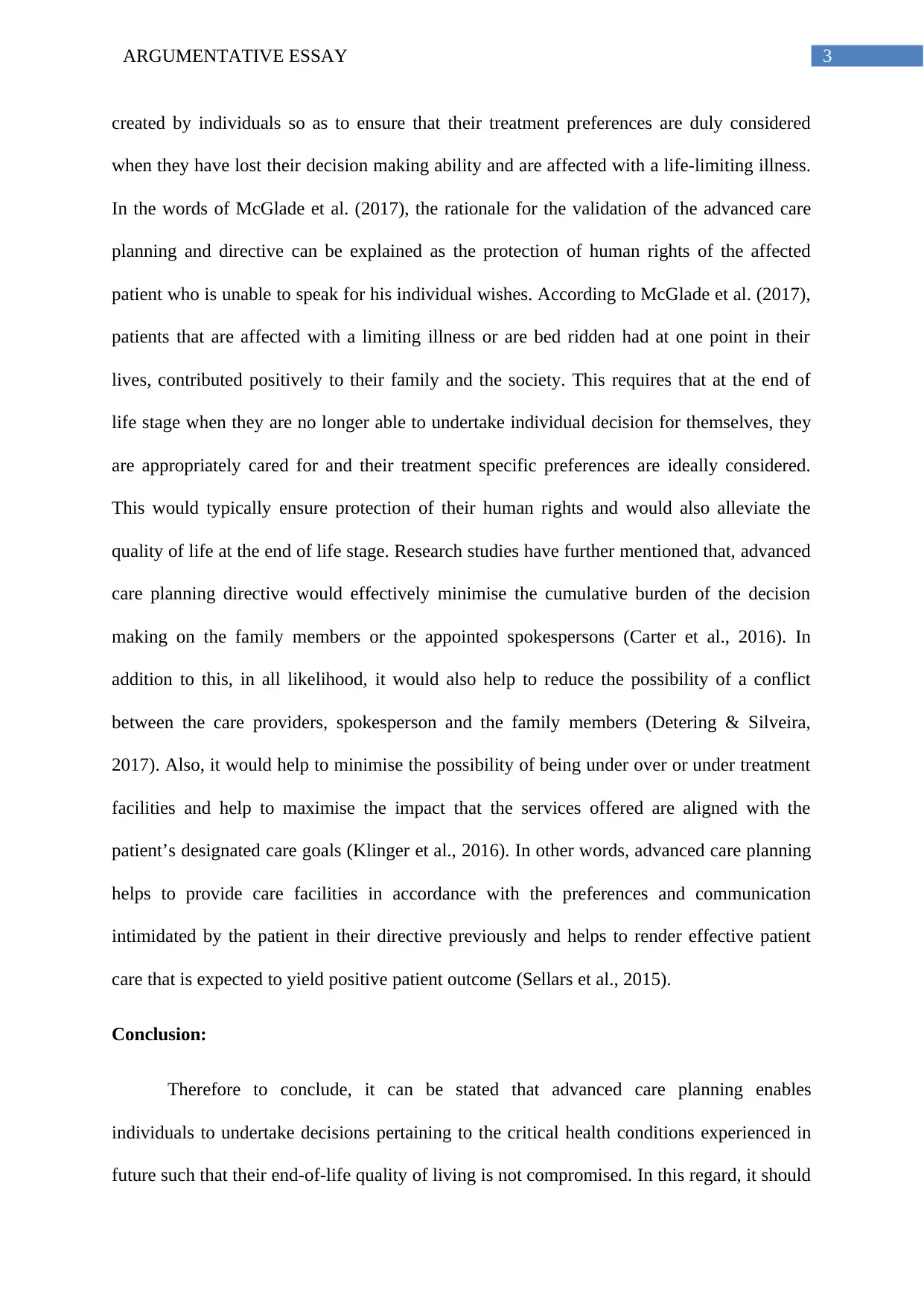
3ARGUMENTATIVE ESSAY
created by individuals so as to ensure that their treatment preferences are duly considered
when they have lost their decision making ability and are affected with a life-limiting illness.
In the words of McGlade et al. (2017), the rationale for the validation of the advanced care
planning and directive can be explained as the protection of human rights of the affected
patient who is unable to speak for his individual wishes. According to McGlade et al. (2017),
patients that are affected with a limiting illness or are bed ridden had at one point in their
lives, contributed positively to their family and the society. This requires that at the end of
life stage when they are no longer able to undertake individual decision for themselves, they
are appropriately cared for and their treatment specific preferences are ideally considered.
This would typically ensure protection of their human rights and would also alleviate the
quality of life at the end of life stage. Research studies have further mentioned that, advanced
care planning directive would effectively minimise the cumulative burden of the decision
making on the family members or the appointed spokespersons (Carter et al., 2016). In
addition to this, in all likelihood, it would also help to reduce the possibility of a conflict
between the care providers, spokesperson and the family members (Detering & Silveira,
2017). Also, it would help to minimise the possibility of being under over or under treatment
facilities and help to maximise the impact that the services offered are aligned with the
patient’s designated care goals (Klinger et al., 2016). In other words, advanced care planning
helps to provide care facilities in accordance with the preferences and communication
intimidated by the patient in their directive previously and helps to render effective patient
care that is expected to yield positive patient outcome (Sellars et al., 2015).
Conclusion:
Therefore to conclude, it can be stated that advanced care planning enables
individuals to undertake decisions pertaining to the critical health conditions experienced in
future such that their end-of-life quality of living is not compromised. In this regard, it should
created by individuals so as to ensure that their treatment preferences are duly considered
when they have lost their decision making ability and are affected with a life-limiting illness.
In the words of McGlade et al. (2017), the rationale for the validation of the advanced care
planning and directive can be explained as the protection of human rights of the affected
patient who is unable to speak for his individual wishes. According to McGlade et al. (2017),
patients that are affected with a limiting illness or are bed ridden had at one point in their
lives, contributed positively to their family and the society. This requires that at the end of
life stage when they are no longer able to undertake individual decision for themselves, they
are appropriately cared for and their treatment specific preferences are ideally considered.
This would typically ensure protection of their human rights and would also alleviate the
quality of life at the end of life stage. Research studies have further mentioned that, advanced
care planning directive would effectively minimise the cumulative burden of the decision
making on the family members or the appointed spokespersons (Carter et al., 2016). In
addition to this, in all likelihood, it would also help to reduce the possibility of a conflict
between the care providers, spokesperson and the family members (Detering & Silveira,
2017). Also, it would help to minimise the possibility of being under over or under treatment
facilities and help to maximise the impact that the services offered are aligned with the
patient’s designated care goals (Klinger et al., 2016). In other words, advanced care planning
helps to provide care facilities in accordance with the preferences and communication
intimidated by the patient in their directive previously and helps to render effective patient
care that is expected to yield positive patient outcome (Sellars et al., 2015).
Conclusion:
Therefore to conclude, it can be stated that advanced care planning enables
individuals to undertake decisions pertaining to the critical health conditions experienced in
future such that their end-of-life quality of living is not compromised. In this regard, it should
Paraphrase This Document
Need a fresh take? Get an instant paraphrase of this document with our AI Paraphraser
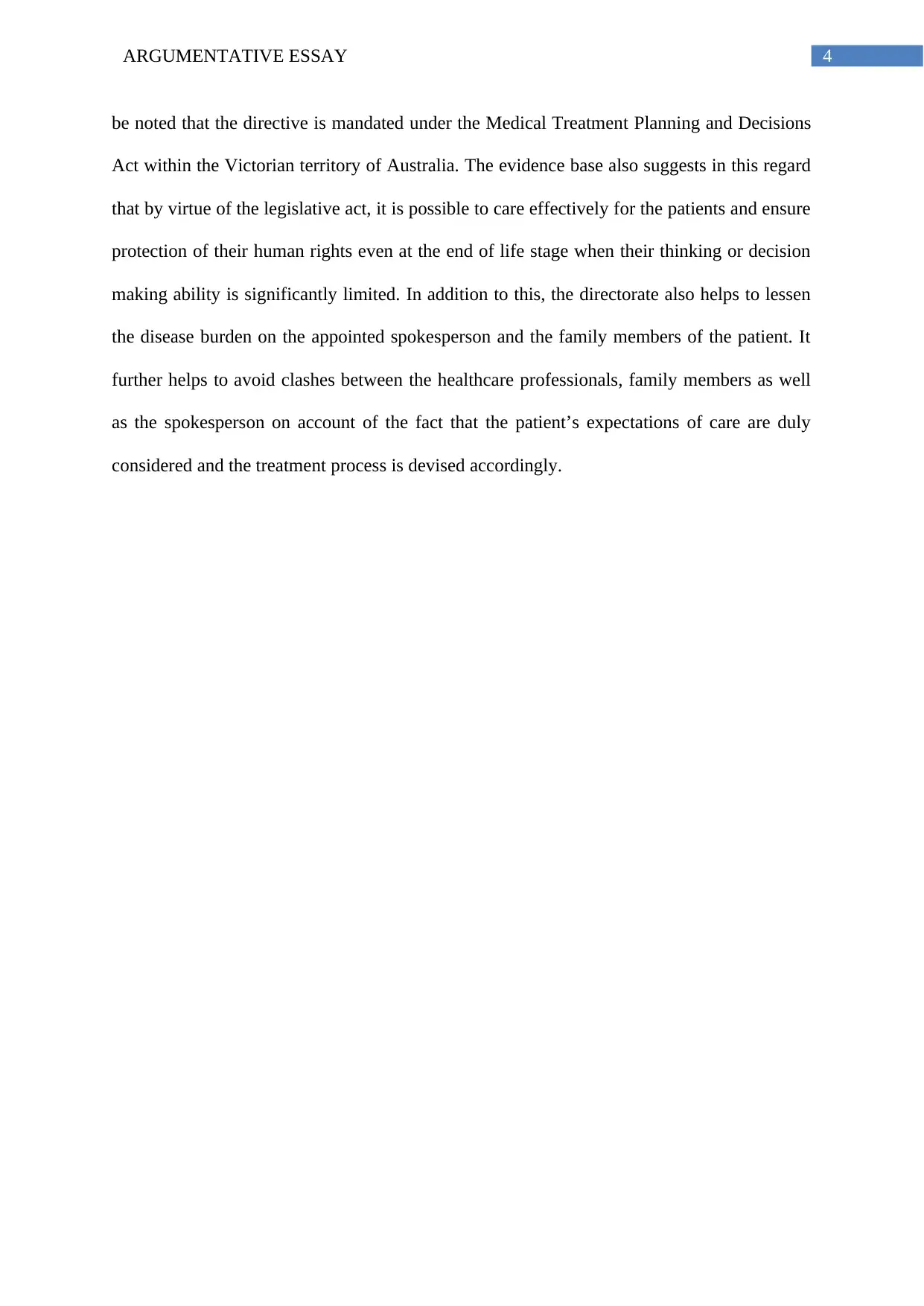
4ARGUMENTATIVE ESSAY
be noted that the directive is mandated under the Medical Treatment Planning and Decisions
Act within the Victorian territory of Australia. The evidence base also suggests in this regard
that by virtue of the legislative act, it is possible to care effectively for the patients and ensure
protection of their human rights even at the end of life stage when their thinking or decision
making ability is significantly limited. In addition to this, the directorate also helps to lessen
the disease burden on the appointed spokesperson and the family members of the patient. It
further helps to avoid clashes between the healthcare professionals, family members as well
as the spokesperson on account of the fact that the patient’s expectations of care are duly
considered and the treatment process is devised accordingly.
be noted that the directive is mandated under the Medical Treatment Planning and Decisions
Act within the Victorian territory of Australia. The evidence base also suggests in this regard
that by virtue of the legislative act, it is possible to care effectively for the patients and ensure
protection of their human rights even at the end of life stage when their thinking or decision
making ability is significantly limited. In addition to this, the directorate also helps to lessen
the disease burden on the appointed spokesperson and the family members of the patient. It
further helps to avoid clashes between the healthcare professionals, family members as well
as the spokesperson on account of the fact that the patient’s expectations of care are duly
considered and the treatment process is devised accordingly.
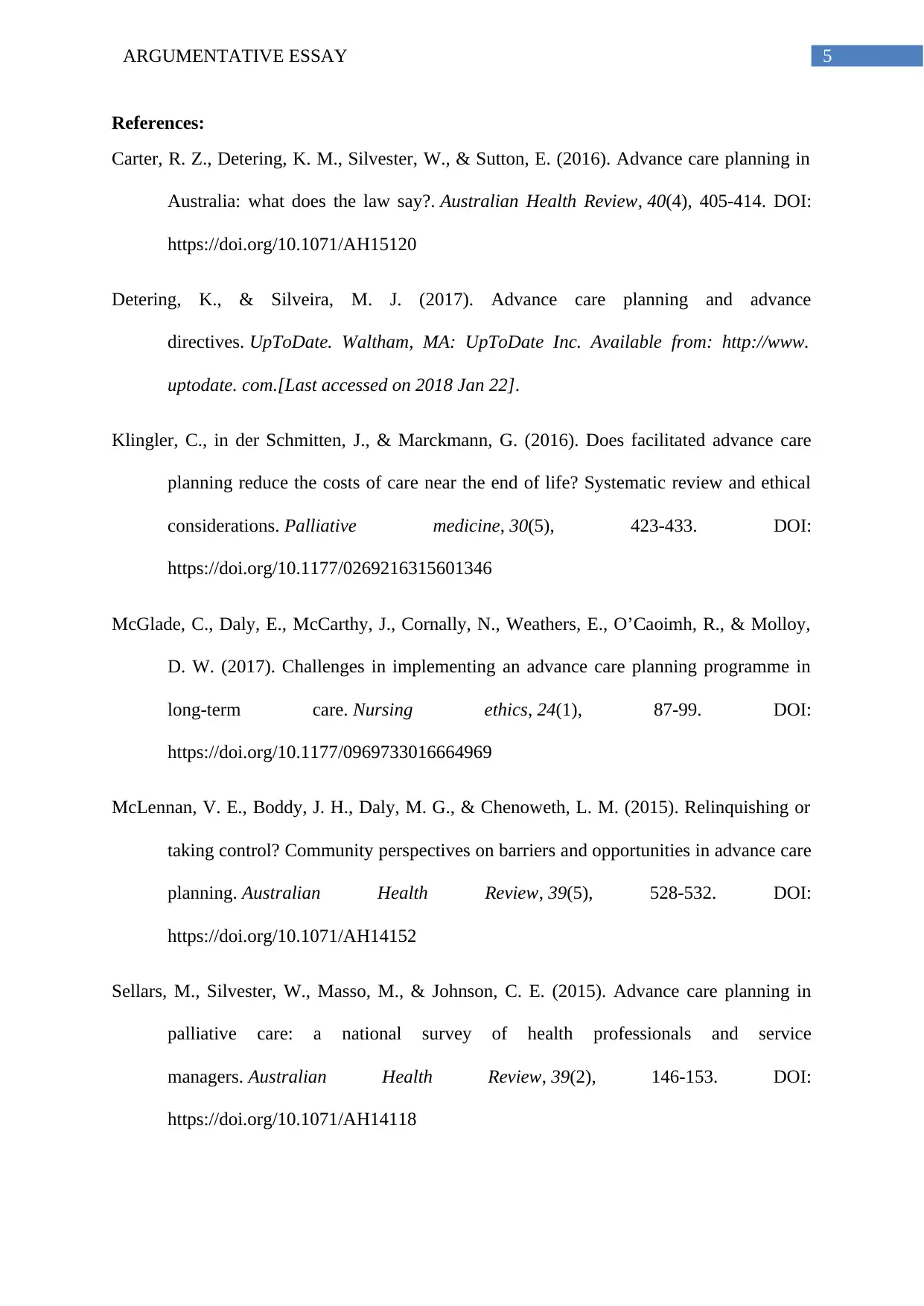
5ARGUMENTATIVE ESSAY
References:
Carter, R. Z., Detering, K. M., Silvester, W., & Sutton, E. (2016). Advance care planning in
Australia: what does the law say?. Australian Health Review, 40(4), 405-414. DOI:
https://doi.org/10.1071/AH15120
Detering, K., & Silveira, M. J. (2017). Advance care planning and advance
directives. UpToDate. Waltham, MA: UpToDate Inc. Available from: http://www.
uptodate. com.[Last accessed on 2018 Jan 22].
Klingler, C., in der Schmitten, J., & Marckmann, G. (2016). Does facilitated advance care
planning reduce the costs of care near the end of life? Systematic review and ethical
considerations. Palliative medicine, 30(5), 423-433. DOI:
https://doi.org/10.1177/0269216315601346
McGlade, C., Daly, E., McCarthy, J., Cornally, N., Weathers, E., O’Caoimh, R., & Molloy,
D. W. (2017). Challenges in implementing an advance care planning programme in
long-term care. Nursing ethics, 24(1), 87-99. DOI:
https://doi.org/10.1177/0969733016664969
McLennan, V. E., Boddy, J. H., Daly, M. G., & Chenoweth, L. M. (2015). Relinquishing or
taking control? Community perspectives on barriers and opportunities in advance care
planning. Australian Health Review, 39(5), 528-532. DOI:
https://doi.org/10.1071/AH14152
Sellars, M., Silvester, W., Masso, M., & Johnson, C. E. (2015). Advance care planning in
palliative care: a national survey of health professionals and service
managers. Australian Health Review, 39(2), 146-153. DOI:
https://doi.org/10.1071/AH14118
References:
Carter, R. Z., Detering, K. M., Silvester, W., & Sutton, E. (2016). Advance care planning in
Australia: what does the law say?. Australian Health Review, 40(4), 405-414. DOI:
https://doi.org/10.1071/AH15120
Detering, K., & Silveira, M. J. (2017). Advance care planning and advance
directives. UpToDate. Waltham, MA: UpToDate Inc. Available from: http://www.
uptodate. com.[Last accessed on 2018 Jan 22].
Klingler, C., in der Schmitten, J., & Marckmann, G. (2016). Does facilitated advance care
planning reduce the costs of care near the end of life? Systematic review and ethical
considerations. Palliative medicine, 30(5), 423-433. DOI:
https://doi.org/10.1177/0269216315601346
McGlade, C., Daly, E., McCarthy, J., Cornally, N., Weathers, E., O’Caoimh, R., & Molloy,
D. W. (2017). Challenges in implementing an advance care planning programme in
long-term care. Nursing ethics, 24(1), 87-99. DOI:
https://doi.org/10.1177/0969733016664969
McLennan, V. E., Boddy, J. H., Daly, M. G., & Chenoweth, L. M. (2015). Relinquishing or
taking control? Community perspectives on barriers and opportunities in advance care
planning. Australian Health Review, 39(5), 528-532. DOI:
https://doi.org/10.1071/AH14152
Sellars, M., Silvester, W., Masso, M., & Johnson, C. E. (2015). Advance care planning in
palliative care: a national survey of health professionals and service
managers. Australian Health Review, 39(2), 146-153. DOI:
https://doi.org/10.1071/AH14118
⊘ This is a preview!⊘
Do you want full access?
Subscribe today to unlock all pages.

Trusted by 1+ million students worldwide
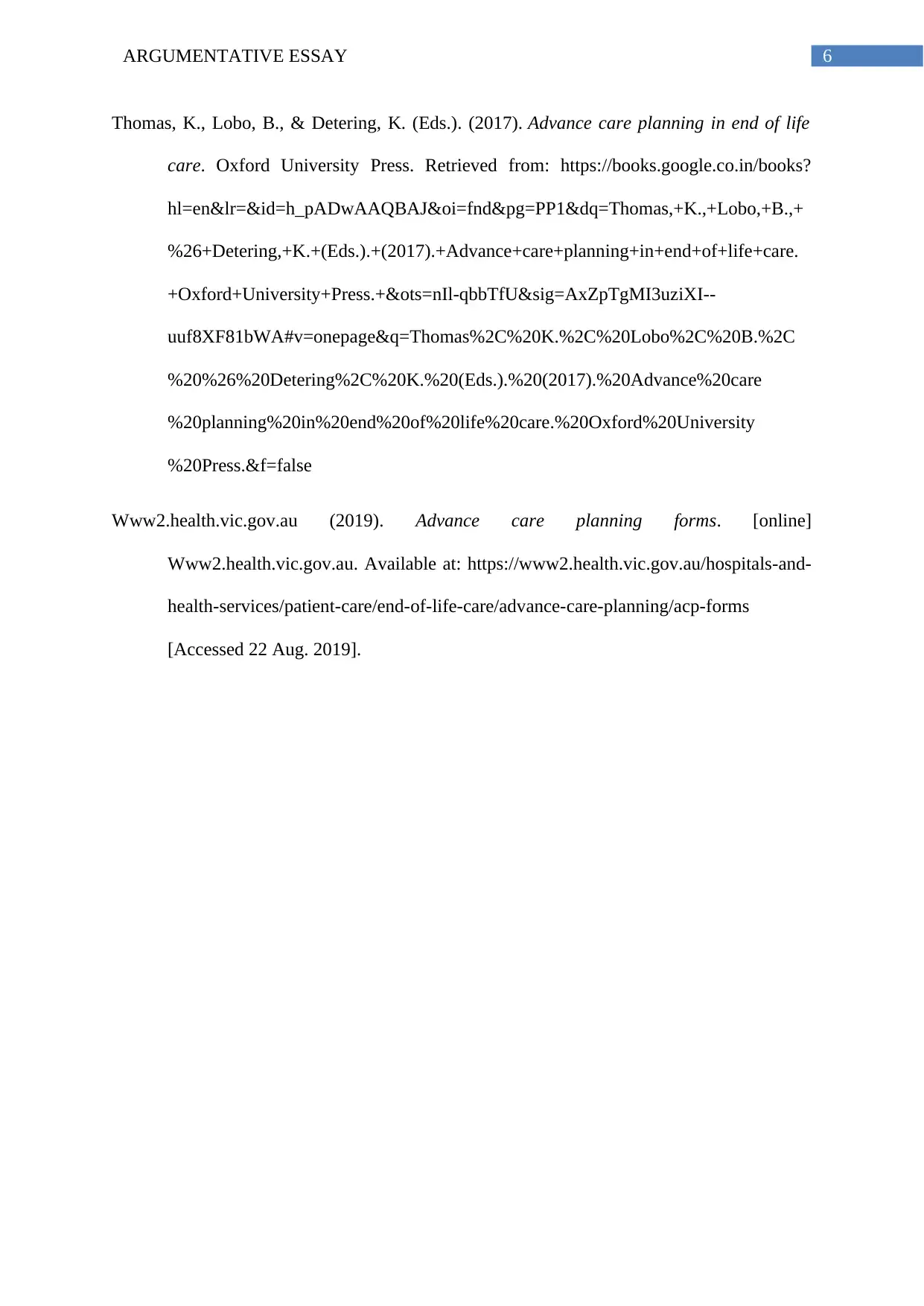
6ARGUMENTATIVE ESSAY
Thomas, K., Lobo, B., & Detering, K. (Eds.). (2017). Advance care planning in end of life
care. Oxford University Press. Retrieved from: https://books.google.co.in/books?
hl=en&lr=&id=h_pADwAAQBAJ&oi=fnd&pg=PP1&dq=Thomas,+K.,+Lobo,+B.,+
%26+Detering,+K.+(Eds.).+(2017).+Advance+care+planning+in+end+of+life+care.
+Oxford+University+Press.+&ots=nIl-qbbTfU&sig=AxZpTgMI3uziXI--
uuf8XF81bWA#v=onepage&q=Thomas%2C%20K.%2C%20Lobo%2C%20B.%2C
%20%26%20Detering%2C%20K.%20(Eds.).%20(2017).%20Advance%20care
%20planning%20in%20end%20of%20life%20care.%20Oxford%20University
%20Press.&f=false
Www2.health.vic.gov.au (2019). Advance care planning forms. [online]
Www2.health.vic.gov.au. Available at: https://www2.health.vic.gov.au/hospitals-and-
health-services/patient-care/end-of-life-care/advance-care-planning/acp-forms
[Accessed 22 Aug. 2019].
Thomas, K., Lobo, B., & Detering, K. (Eds.). (2017). Advance care planning in end of life
care. Oxford University Press. Retrieved from: https://books.google.co.in/books?
hl=en&lr=&id=h_pADwAAQBAJ&oi=fnd&pg=PP1&dq=Thomas,+K.,+Lobo,+B.,+
%26+Detering,+K.+(Eds.).+(2017).+Advance+care+planning+in+end+of+life+care.
+Oxford+University+Press.+&ots=nIl-qbbTfU&sig=AxZpTgMI3uziXI--
uuf8XF81bWA#v=onepage&q=Thomas%2C%20K.%2C%20Lobo%2C%20B.%2C
%20%26%20Detering%2C%20K.%20(Eds.).%20(2017).%20Advance%20care
%20planning%20in%20end%20of%20life%20care.%20Oxford%20University
%20Press.&f=false
Www2.health.vic.gov.au (2019). Advance care planning forms. [online]
Www2.health.vic.gov.au. Available at: https://www2.health.vic.gov.au/hospitals-and-
health-services/patient-care/end-of-life-care/advance-care-planning/acp-forms
[Accessed 22 Aug. 2019].
1 out of 7
Related Documents
Your All-in-One AI-Powered Toolkit for Academic Success.
+13062052269
info@desklib.com
Available 24*7 on WhatsApp / Email
![[object Object]](/_next/static/media/star-bottom.7253800d.svg)
Unlock your academic potential
Copyright © 2020–2026 A2Z Services. All Rights Reserved. Developed and managed by ZUCOL.





